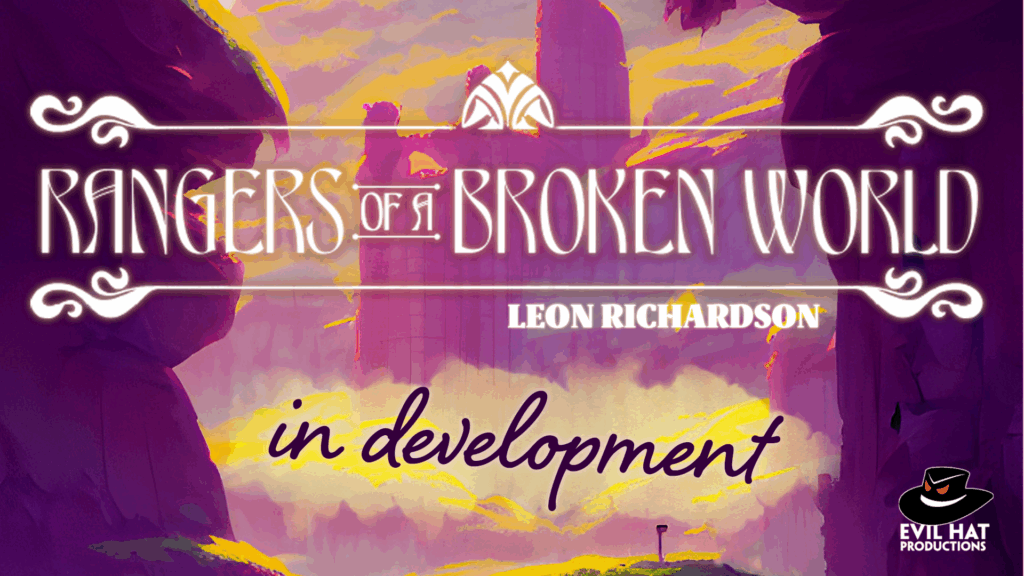Welcome to the third post in a series of Design Diaries for Rangers of a Broken World by the creator Leon Richardson:

…
Rangers of a Broken World is a game about hope. It has been ever since I first started writing it! It contains my hope for a future where people come together to help one another, where borders and politics don’t get in the way of human kindness in the struggle for survival, and where we don’t make enemies of one another anymore.
As time has gone on, that hope has seemed more and more remote. The world has made me cynical, I’m afraid, but that has made it even more important for me to present a vision of a hopeful world. That’s not to say that there’s not a place for cynical, rough-edged, and brutal art – just to say that I feel there’s an equal place for soft, hopeful, and gentle art too.
I want to present a vision worth aspiring to. If people need a hopeful world to escape to, then I want to give them a world that will sustain them. To me, there’s nothing wrong with that. The human heart needs hope as much as the human mind needs truth!
Post-apocalyptic media tends to fall into two broad categories, at least as far as I can see. (I’m not an expert in it, and I’m sure the experts would say it’s much more complex!)
To many artists creating post-apocalyptic work, society is a fragile thing that, once destroyed, leaves human beings little better than animals. These works showcase the human capacity for cruelty, the desperation to survive in an inhospitable world, and the ruins of safety. I feel like these works take a lot from stories like Lord of the Flies, stories that propose humanity as delicate, fragile, and ready to descend to cruelty in an instant. The moment there are no police, no law courts, and no banks, people would crumble into a mess of violence and evil.
I’m not sure I agree with that. I’ve seen enough disasters in my time to know that the desire to take care of one another isn’t an artificial construct. We are social animals – taking care of one another is an essential part of our nature. If “society” were stripped away, I think that we would still be social animals after the borders, capitalism, and other constraints on our lives were destroyed. Some people call this tradition “hopepunk”, and it encompasses traditions like “solarpunk” too – works that follow this philosophy tend to want to showcase a world where everything but human kindness has been destroyed and given a chance to start over.
Amylte is this kind of world. A world where people have stopped imagining borders and separations between each other and started recreating society in a way that I think is natural human instinct – together. It may be a little anarchistic of me, but I genuinely believe that many of the aspects of society that are holding us back are imaginary and unneeded, and can be destroyed without leaving us any worse off.
Now, that’s not to say that I’ve written a world with no laws, banks, or police allowed. You can certainly play with those themes if you like! That’s why I decided that communities decide for themselves how to run their own affairs – a Conductor is free to create a community that enforces norms and laws with force, or with capitalist oppression. There’s value in presenting these systems of oppression for players to interact with, question, and even dismantle if they like! That’s part of the core design of the Noble Demons – they represent class oppression and rulership in its most toxic form, in a form players can interact with and struggle against despite their overwhelming power.
One of my guiding principles in writing Rangers of a Broken World is that sometimes people want to imagine a world where they are not oppressed, and that there’s nothing wrong with that. I think it’s beautiful to spend time and energy engaging with the world not as it is, but as we want it to be. What would the world look like if marginalized people didn’t have to prove themselves left right and centre? What would our lives be like if countries didn’t exist? Without government larger than a single city, what would happen?
In order to create a peaceful world, I think we can start by imagining one. The imagination, the vision for the future, is a fertile place for hope to grow. I hope that Rangers of a Broken World helps you nourish your own hope, or at least give you shelter from a cruel world.
